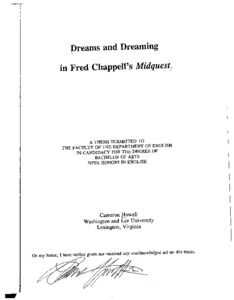| dc.description.abstract | Dreams emerge as prominent motifs throughout Fred Chappell' s many poems, novels, short stories, and essays. . . . These statements hold equally true for Chappell's Midquest. A "verse novel," as the poet calls his carefully structured book in its preface, Midquest is divided into four volumes, each containing eleven poems and each deriving its imagery from one of the four classical elements, as the titles River, Bloodfire, Wind Mountain, and Earthsleep suggest (ix). These four volumes repeat four times the thirty-fifth birthday of the book's protagonist, Ole Fred, from whom Chappell deliberately distances himself by saying that he "is no more myself than any character in any novel I might chose to write" (x). Modeled in part after Dante's Divine Comedy, Midquest presents Fred as he examines his past, present, and future. The many poetic forms which compose the book correspond to Fred's various memories and experiences, also introducing Fred's wife, family, and acquaintances. Dreams emerge repeatedly in these poems, in the sleeping thoughts or memories of Fred and others. The eight poems which frame each of the four volumes detail Fred's dreams, and two other poems are dedicated in their entirety to the presentation of dreams experienced by Fred's wife and grandmother. These and other poems allow Chappell to explore the nature of dreaming and the relationship between dreaming and waking. In terms of imagery and
theme, Chappell challenges the notion that dreaming can be separated from or subordinated to waking. Fred resolves issues which are very important to his life during his dreams, and other dreamers find that images from their sleep change their lives when they awaken. Just as with Chappell's other works, Midquest suggests that dreams provide insightful meaning and that dreams are just as real as waking life. [From Introduction] | en_US |
| dc.rights | This material is made available for use in research, teaching, and private study, pursuant to U.S. Copyright law. The user assumes full responsibility for any use of the materials, including but not limited to, infringement of copyright and publication rights of reproduced materials. Any materials used should be fully credited with the source. | en_US |
